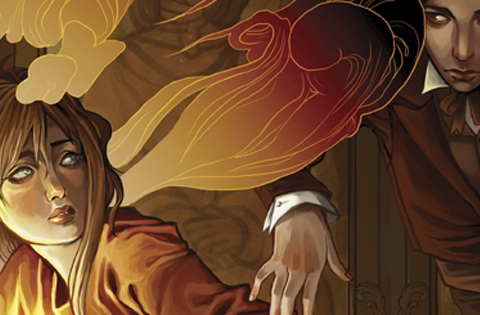| |
| |
Nov 24, 2024
|
|
|
|
|
2017-2018 University Catalog [Archived Catalogue]
Illustration, Bachelor of Fine Arts
|
|
Programs > Programs in the College of Art, Media, & Design
Contacts Description Program Objectives Academic Plan Program Requirements

Quick Links
College of Art, Media & Design
School of Design
Liberal Arts Distribution
Contacts
Matthew Curtius \ mcurtius@uarts.edu \ 215.717.6240
Program Director
Description
The Illustration curriculum is a blend of drawing, painting, figure modeling, picture making, illustration, creative visual problem solving, digital experiences, self-discovery through mentor-student relationship, history of pictorial image making, and specialized graphic design courses. Some courses are geared to developing foundational skills and others more focused toward professional application. This curriculum offers its majors a wide selection of unique options to explore related to their field and interest of study. Pedagogical emphasis is on discovering and developing the artist within the illustrator and his/her unique point of view. When artists find their unique expression, they can take advantage of all the outlets available to their work. The program prepares individual students for a life in the arts and the flexibility to enter diverse professional areas within it.
Illustration is a unique art form that is defined not by its medium, but by its context. Illustration finds its home in the public sphere of popular media. With a rich history and a modern, contemporary outlook, illustration brings life to concepts and stories through image making. Whether created digitally or by hand, an illustration can be both a masterful work of art and a practical business application. Illustrators marry their ability to create visually striking images with their ability to solve problems in unique and engaging ways. Illustrators create images for a variety of outlets that include children’s books, advertising campaigns, clothing, packaging and store displays, video games, movies, animations, and comic books. Illustrators are art directors, graphic, package and product designers, computer game developers, character designers, digital artists, animators, exhibit designers, and storyboard, concept and studio artists.
Program Objectives
Students graduating with a Bachelor of Fine Arts in Illustration will:
- Demonstrate knowledge of figure study and picture making, along with traditional and digital technical skill development, leading to successful image making as it relates to the multi-faceted and ever-changing illustration industry;
- Discover and develop point of view (critical thinking, self-discovery, and effectively combing content and technique in a unique expression). This includes acquiring critical drawing and thinking skills and developing intellectual curiosity leading to successful problem solving and meaningful visual communication;
- Understanding the unique aesthetic of the illustrator as designer and the development of knowledge and skills leading to successful design outcomes;
- Discover the languages, concepts, and practices of contemporary illustration across connected disciplines and have options to further explore those areas in depth;
- Acquire and demonstrate knowledge of the history of illustration;
- Demonstrate habits of mind (studio process, research, personal discipline, time management, professional culture of the program) as well as the ability to critique, articulate their work, and present ideas;
- Acquire and demonstrate knowledge and skills of professional development (presentation, audience awareness, marketing, promotion, business, Web design, entrepreneurship). Preparing for a life in the arts and the flexibility to enter diverse professional areas within it.
Academic Plan
Academic plans provide a semester by semester suggested course sequence. Plans can be customized through discussions with academic advisors.
Program Requirements (126 credits)
|
CAMD College Core (18 credits)
Student Choice
Complete two of the following groups:
CAMD School Core (6 credits)
All CAMD students are required to complete 6 credits of School Core coursework after completing Core Studies. Students are free to select courses from any school or college-wide program.
Illustration (College-Wide Program)
Major Requirements (39 Credits)
Students who major in Illustration will complete 39 credits, while students who declare a concentration within the Illustration program will complete 42 credits. Concentration
Illustration students who declare a concentration should complete the corresponding concentration course sequence below. Eligibility, process, including entry to fouth year capstones based on completing concentration and subject to portolio review.
Animation Visual Development
Graphic Design Communication
Graphic Design Typography
Discipline History (12 credits)
Liberal Arts Distribution (30 credits)
First Year Writing (6 credits)
- or 3 credits
- or 3 credits
Humanities Seminar (3 credits)
- Select 1 course from subject HUMS
Period Interpretation (6 credits)
- Select 1 course from subject PIPT
- Select 1 course from subject PITC
Scientific Inquiry Foundation Track (3 credits)
- Select 1 course from subject SIFT
Liberal Arts Electives (12 credits)
- Select courses from subjects:
- AHST (Art History), HIST (History)
- ARAB (Arabic), FRCH (French), ITAL (Italian), LITT (Literature)
- PHIL (Philosophy), RELI (Religion)
- MATH (Math), SCIE (Science)
- ANTH (Anthropology), PHIL (Philosophy), PSYC (Psychology), SOCI (Sociology)
- STCU (Cultural Studies), STDA (Dance Studies), STGS (Gender & Sexuality Studies),
STMU (Music Studies), STPF (Performance Studies)
- Select courses from : Art History or LA Elective.
Electives (13.5 - 16.5 credits)
- Illustration majors complete 16.5 credits of free electives. Illustration students who have declared a concentration complete 13.5 credits of free electives. This requirement is satisfied by any undergraduate course that isn’t required by the program.
|
|
|
|